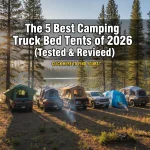[Get the best value camping heater tent on Amazon today!]
# Stay Warm All Night: The Ultimate Guide to Camping Heaters for Tents
Camping can be an amazing experience, connecting you with nature and offering a break from the everyday hustle. But let’s be honest, a chilly night in a tent can quickly turn a dream trip into an uncomfortable ordeal. That’s where a camping heater for your tent comes in. This guide is your one-stop resource for understanding, choosing, and safely using a camping heater to ensure you stay warm and cozy all night long. We’ll cover everything you need to know, from types of heaters to safety precautions, so you can enjoy your outdoor adventures to the fullest.
[Browse top-rated camping heater tent on Amazon]
## 1. Choosing the Right Camping Heater for Your Tent
Before diving into specific models, it’s crucial to understand the different types of camping heaters available and which one is best suited for your needs. Factors like tent size, climate, and personal preferences all play a significant role in making the right choice.
### 1.1 Types of Camping Heaters
There are primarily three types of camping heaters: propane, electric, and catalytic. Each has its own set of advantages and disadvantages.
* **Propane Heaters:** These are the most common type of camping heater. They are relatively inexpensive, readily available, and produce a good amount of heat. Propane heaters require propane tanks, which can add to the overall weight and bulk of your camping gear. They also produce carbon monoxide, so proper ventilation is essential.
* **Electric Heaters:** Electric heaters are a safe and convenient option, especially if you have access to a power source at your campsite. They don’t produce carbon monoxide, making them safer for enclosed spaces. However, they rely on electricity, which may not be available in remote camping locations. They are also typically less powerful than propane heaters.
* **Catalytic Heaters:** Catalytic heaters use a chemical reaction to produce heat without an open flame. They are generally considered safer than propane heaters because they produce less carbon monoxide. They are also more fuel-efficient, meaning you can get more heat out of a single fuel canister. However, they can be more expensive than propane heaters.
### 1.2 Key Considerations When Choosing a Camping Heater
* **Tent Size:** The size of your tent is a crucial factor in determining the appropriate heater size. A small heater may not be sufficient to heat a large tent, while a large heater can quickly overheat a small tent. Check the heater’s BTU (British Thermal Unit) rating, which indicates its heating capacity. As a general rule, a smaller tent (2-3 person) requires a heater with a lower BTU rating (around 4,000-5,000 BTU), while a larger tent (4-6 person) may require a heater with a higher BTU rating (around 9,000-10,000 BTU).
* **Safety Features:** Safety should always be your top priority when using a camping heater. Look for heaters with safety features like tip-over switches, oxygen depletion sensors (ODS), and automatic shut-off mechanisms. These features can help prevent accidents and ensure your safety while using the heater in your tent.
* **Ventilation:** Proper ventilation is essential when using any type of camping heater, especially propane heaters. Carbon monoxide is a colorless, odorless gas that can be deadly. Make sure your tent has adequate ventilation to prevent carbon monoxide buildup. Never use a camping heater in a completely sealed tent.
* **Portability:** If you plan on backpacking or hiking to your campsite, portability is an important consideration. Look for lightweight and compact heaters that are easy to carry. Propane heaters may require carrying additional propane tanks, which can add to the overall weight of your gear.
* **Ease of Use:** Choose a heater that is easy to set up and operate. Look for features like push-button ignition, adjustable heat settings, and clear instructions. A user-friendly heater will make your camping experience more enjoyable.
* **Fuel Efficiency:** Consider the fuel efficiency of the heater, especially if you plan on using it for extended periods. Propane heaters typically burn through propane faster than catalytic heaters. Look for heaters with features like adjustable heat settings and automatic shut-off to conserve fuel.
* **Altitude:** If you are camping at high altitudes, you may need a special type of heater that is designed to work in lower oxygen environments. Standard propane heaters may not function properly at high altitudes.
[Browse top-rated camping heater tent on Amazon]
## 2. Top Camping Heater Tent Recommendations
Now that you understand the different types of camping heaters and the key considerations, let’s take a look at some of the top-rated camping heaters for tents.
### 2.1 Mr. Heater Buddy
**Best For:** General camping and moderate climates.
**Key Features:**
* 4,000-9,000 BTU adjustable heat settings.
* Automatic low-oxygen shut-off system (ODS).
* Tip-over safety shut-off.
* Connects to a 1 lb. propane cylinder or a 20 lb. propane tank with optional hose.
**Why We Like It:** The Mr. Heater Buddy is a popular choice for camping due to its versatility and ease of use. It provides ample heat for small to medium-sized tents and has essential safety features. Its adjustable heat settings allow you to customize the temperature to your liking.
### 2.2 Texsport Sportsmate Propane Heater
**Best For:** Budget-conscious campers and emergency heating.
**Key Features:**
* 3,000 BTU output.
* Automatic safety shut-off valve.
* Stainless steel burner.
* Porcelain-coated reflector.
**Why We Like It:** The Texsport Sportsmate is a simple and affordable option for campers who need a basic heating solution. It’s compact and lightweight, making it easy to carry. While it doesn’t have as many features as other heaters, it provides reliable heat and essential safety features.
### 2.3 Camco Olympian Wave-3 Propane Heater
**Best For:** RVs and larger tents requiring consistent, quiet heat.
**Key Features:**
* 3,000 BTU output.
* Clean, quiet, and odorless operation.
* No electricity required.
* Mountable design.
**Why We Like It:** The Camco Olympian Wave-3 is a radiant heater that provides consistent and quiet heat. It doesn’t require electricity, making it a great option for off-grid camping. Its mountable design allows you to securely attach it to a wall or other surface.
[Browse top-rated camping heater tent on Amazon]
## 3. Safety First: Using Your Camping Heater Tent Responsibly
Safety is paramount when using any type of camping heater in a tent. Following these safety guidelines will help prevent accidents and ensure your well-being.
### 3.1 Carbon Monoxide Awareness
Carbon monoxide (CO) is a colorless, odorless gas that can be deadly. It is produced by burning fuels like propane, kerosene, and wood. When inhaled, CO prevents the blood from carrying oxygen, leading to suffocation. Symptoms of CO poisoning include headache, dizziness, nausea, vomiting, and loss of consciousness.
* **Install a Carbon Monoxide Detector:** Always use a battery-operated carbon monoxide detector inside your tent when using a camping heater. Test the detector before each trip to ensure it is working properly.
* **Ensure Proper Ventilation:** Never use a camping heater in a completely sealed tent. Open vents and windows to allow for adequate ventilation. If you start to feel any symptoms of CO poisoning, immediately turn off the heater and ventilate the tent.
* **Never Sleep with a Heater On:** It’s best to turn off the heater before going to sleep to minimize the risk of CO poisoning. If you feel you need to leave it on, ensure maximum ventilation and that your CO detector is working.
### 3.2 General Safety Tips
* **Read the Manual:** Always read and follow the manufacturer’s instructions for your specific heater model.
* **Keep Flammables Away:** Keep flammable materials like clothing, sleeping bags, and tents away from the heater.
* **Stable Placement:** Place the heater on a stable, level surface to prevent it from tipping over.
* **Supervise Children and Pets:** Never leave children or pets unattended near a camping heater.
* **Check for Leaks:** Before using a propane heater, check for leaks by spraying soapy water on the connections. If you see bubbles, there is a leak. Do not use the heater until the leak is fixed.
* **Proper Storage:** When not in use, store the heater and fuel canisters in a safe and secure location, away from heat and direct sunlight.
[Browse top-rated camping heater tent on Amazon]
## 4. Setting Up Your Camping Heater for Optimal Performance
Proper setup is crucial for maximizing the efficiency and safety of your camping heater.
### 4.1 Choosing the Right Location
* **Level Surface:** Place the heater on a level surface to prevent it from tipping over.
* **Clearance:** Ensure there is adequate clearance around the heater to prevent flammable materials from catching fire.
* **Ventilation:** Position the heater near a vent or window to promote airflow and prevent carbon monoxide buildup.
* **Away from Exits:** Avoid placing the heater near the tent entrance or exit to prevent accidental contact.
### 4.2 Connecting the Fuel Source
* **Propane Heaters:** Connect the propane tank to the heater according to the manufacturer’s instructions. Make sure the connections are tight and secure to prevent leaks.
* **Electric Heaters:** Plug the heater into a power source, such as a generator or a portable power station.
* **Catalytic Heaters
[Check the latest prices and deals for camping heater tent on Amazon today!]







